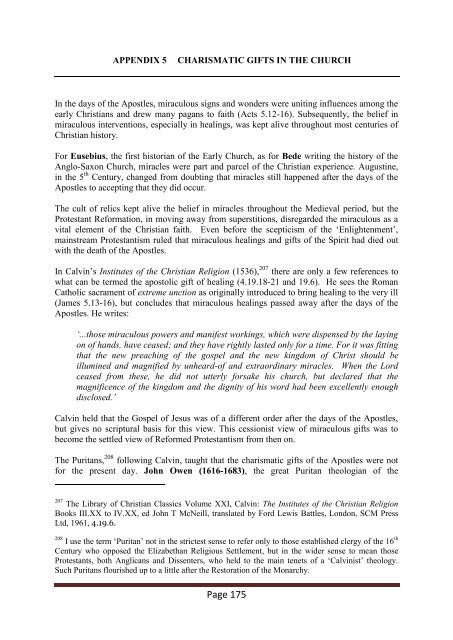Digging Out the Embedded Church - The Maranatha Community
Digging Out the Embedded Church - The Maranatha Community
Digging Out the Embedded Church - The Maranatha Community
You also want an ePaper? Increase the reach of your titles
YUMPU automatically turns print PDFs into web optimized ePapers that Google loves.
APPENDIX 5 CHARISMATIC GIFTS IN THE CHURCH<br />
In <strong>the</strong> days of <strong>the</strong> Apostles, miraculous signs and wonders were uniting influences among <strong>the</strong><br />
early Christians and drew many pagans to faith (Acts 5.12-16). Subsequently, <strong>the</strong> belief in<br />
miraculous interventions, especially in healings, was kept alive throughout most centuries of<br />
Christian history.<br />
For Eusebius, <strong>the</strong> first historian of <strong>the</strong> Early <strong>Church</strong>, as for Bede writing <strong>the</strong> history of <strong>the</strong><br />
Anglo-Saxon <strong>Church</strong>, miracles were part and parcel of <strong>the</strong> Christian experience. Augustine,<br />
in <strong>the</strong> 5 th Century, changed from doubting that miracles still happened after <strong>the</strong> days of <strong>the</strong><br />
Apostles to accepting that <strong>the</strong>y did occur.<br />
<strong>The</strong> cult of relics kept alive <strong>the</strong> belief in miracles throughout <strong>the</strong> Medieval period, but <strong>the</strong><br />
Protestant Reformation, in moving away from superstitions, disregarded <strong>the</strong> miraculous as a<br />
vital element of <strong>the</strong> Christian faith. Even before <strong>the</strong> scepticism of <strong>the</strong> „Enlightenment‟,<br />
mainstream Protestantism ruled that miraculous healings and gifts of <strong>the</strong> Spirit had died out<br />
with <strong>the</strong> death of <strong>the</strong> Apostles.<br />
In Calvin‟s Institutes of <strong>the</strong> Christian Religion (1536), 207 <strong>the</strong>re are only a few references to<br />
what can be termed <strong>the</strong> apostolic gift of healing (4.19.18-21 and 19.6). He sees <strong>the</strong> Roman<br />
Catholic sacrament of extreme unction as originally introduced to bring healing to <strong>the</strong> very ill<br />
(James 5.13-16), but concludes that miraculous healings passed away after <strong>the</strong> days of <strong>the</strong><br />
Apostles. He writes:<br />
„...those miraculous powers and manifest workings, which were dispensed by <strong>the</strong> laying<br />
on of hands, have ceased; and <strong>the</strong>y have rightly lasted only for a time. For it was fitting<br />
that <strong>the</strong> new preaching of <strong>the</strong> gospel and <strong>the</strong> new kingdom of Christ should be<br />
illumined and magnified by unheard-of and extraordinary miracles. When <strong>the</strong> Lord<br />
ceased from <strong>the</strong>se, he did not utterly forsake his church, but declared that <strong>the</strong><br />
magnificence of <strong>the</strong> kingdom and <strong>the</strong> dignity of his word had been excellently enough<br />
disclosed.‟<br />
Calvin held that <strong>the</strong> Gospel of Jesus was of a different order after <strong>the</strong> days of <strong>the</strong> Apostles,<br />
but gives no scriptural basis for this view. This cessionist view of miraculous gifts was to<br />
become <strong>the</strong> settled view of Reformed Protestantism from <strong>the</strong>n on.<br />
<strong>The</strong> Puritans, 208 following Calvin, taught that <strong>the</strong> charismatic gifts of <strong>the</strong> Apostles were not<br />
for <strong>the</strong> present day. John Owen (1616-1683), <strong>the</strong> great Puritan <strong>the</strong>ologian of <strong>the</strong><br />
207 <strong>The</strong> Library of Christian Classics Volume XXI, Calvin: <strong>The</strong> Institutes of <strong>the</strong> Christian Religion<br />
Books III.XX to IV.XX, ed John T McNeill, translated by Ford Lewis Battles, London, SCM Press<br />
Ltd, 1961, 4.19.6.<br />
208 I use <strong>the</strong> term „Puritan‟ not in <strong>the</strong> strictest sense to refer only to those established clergy of <strong>the</strong> 16 th<br />
Century who opposed <strong>the</strong> Elizabethan Religious Settlement, but in <strong>the</strong> wider sense to mean those<br />
Protestants, both Anglicans and Dissenters, who held to <strong>the</strong> main tenets of a „Calvinist‟ <strong>the</strong>ology.<br />
Such Puritans flourished up to a little after <strong>the</strong> Restoration of <strong>the</strong> Monarchy.<br />
Page 175








